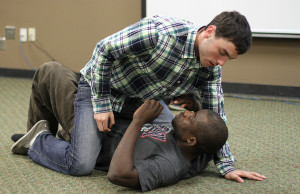
Women’s History Month began with a sexual violence seminar hosted by First Step Incorporated March 10 in Shawnee Theatre.
Brandy Camacho, program director at First Step, gave an hour long presentation about the signs that lead to a sexually abusive relationship, the ways to know if friends are being abused and how women can get out of a sexually violent relationship and eventually cope with the emotional and physical pain.
“The idea that I can get away with it is popular in college,” said Camacho. Men have “fraternity mindsets” and justify their actions with the belief that the victim was asking for it,” Camacho added.
The informational seminar by First Step was part of the celebration of Women’s History Month. Shontesa Jones, multicultural services coordinator, arranged this event with the hopes to teach women to be aware of what can happen to them at any time.
First Step is a safe place for women and can help college women choose wisely about who they start a relationship with said Jones.
Whether a women is sexually active or not, the risk of being attacked is possible. All women could be caught in a hostile and violent sexual situation.
Abuse can happen to anyone, anywhere said Camacho. “It can happen in a quiet location with a person you don’t know well or places where people can’t get to you quickly.”
In order to avoid a sexually violent scenario, a victim might have to go to more drastic measures to avoid harm.
“Women are naive about their safety” said Sandra Grant, communication professor. I suggested Tolu Agunbiade to present at the seminar because he teaches self-defense through mixed martial arts. He teaches women that you don’t have to be in great physical condition or outweigh your attacker to get away. “The moves he teaches are easy and effective,” said Grant.
Tolu Agunbiade is an MSU graduate and mixed martial arts trainer at the Falls Town Fight Club. He teaches classes and competes cage fighting tournaments all around the state.
“Jiu jitsu is the perfect weapon to use in defense against sexual assault. It’s a martial art with emphasis on ground fighting which is good to know if an assailant is trying to pin you down,” Agunbiade said
Along with Tolu, Tarik Mattar, a senior in international relations, helped reenact potentially sexual violent situations. They demonstrated a number of moves a women could do to cut off the circulation to blood, air and movement to the attacker.
Among these moves were moves a women could use to escape an attacker, for example, the kamora sweep, scissor sweep and bravo sweep.
“For a smaller person against a larger person, leverage is an easy way or a smaller person to break free from the larger attacker”, Agunbiade said.
The MMA fighter and student displayed multiples techniques a women could use to specially hurt an attacker. If a victim is being attacked from the back, the most effective move is the Judo throw, you can also use put the attacker in a knee bar to break their knee or the a collar choke to use the attackers own shirt or jacket collar to choke them.
For women not experienced in Jiu jitsu, the simplest technique a women can do is to go for the attackers genitals. “You can always go for that, that should always be a clean move,” said Agunbiade.
Tarik Mattar says that if a women is not comfortable or confident enough to physically fight back, the best thing to do is carry a weapon.
“I think women would be better off carrying pepper spray and being a bit more cautious with who they associate with,” said Mattar.
As audience members watched the violent fighting demonstration, Alexus Laster, a freshman in nursing, said, “I half watched most of the time, it was intense to see Tolu put the other guy in pain. If I was ever in a situation like that, I would hope that I would remember the moves.”
Even though Laster and one other student were among the only audience members, she said she really liked everything she learned. “I really like the demonstration on how to do the collar choke. The whole event gave me more confidence about how to take care of myself. I really wished more girls would have came so they could learn how to be safe.”
During the conclusion to the event, Camacho explained rules to know if a women is in a healthy relationship. “It consist of four main components, communication, trust, love and respect,” Camacho said.
Although, there were only two attendees to the seminar, Jones said she just wants women to have a plan. “I hope women become more aware of sexual violence and more diligent in being a fellow sister to other women.”














